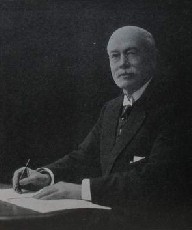David Duncan Main was one of the most famous missionaries in China in the late 19th and early 20th centuries, at a time when China was experiencing tremendous social turmoil. He dedicated forty-five years of his life to medical service in China. He grew up in Scotland, where he was born at Kirkmichael in 1856, and where he studied medicine and business at Glasgow and Edinburgh. He joined the evangelistic revival movement in 1873, and set out on the path of medical missionary work after meeting another missionary. In 1881, he and his wife, Florence Nightingale Smith, left for Hangzhou (or Hangchow), the capital city of Zhejiang Province in southeast China, under the auspices of the Church Missionary Society. Hangzhou is usually described as “Heaven Below” in China because of its great beauty and prosperity.

By the time Duncan Main went to Hangzhou, this city already featured a Western-style medical establishment, which had its origins in 1869, when Dr. Meadows of the Church Missionary Society rented three rooms in a house as a place to cure opium addicts of their addiction. Two years later, Dr. Meadows founded the “Central Hospital,” or “Guangji Hospital” in Chinese, which was the first western hospital in Zhejiang. The local residents called it the “British Hospital” because it was set up by the British. This hospital treated twenty in-patients and 200 out-patients per month. When Duncan Main arrived in Hangzhou in 1881, he took over the hospital in his capacity as the superintendent of Hangzhou’s Church Missionary Society Medical Mission. The hospital expanded rapidly in the following years, and moved into a new building in 1884. In 1885, the hospital established the Hangzhou Medical Training College, with Duncan Main as the principal. In 1892, he set up the women’s hospital and sanatorium which was affiliated with the hospital. In 1889 and 1899, he established a man’s leprosarium and tuberculosis sanatorium respectively. In 1905, the hospital expanded once again, while the female wards, dermatosis wards and obstetrical wards emerged. In 1911, the hospital was equipped with electric lamps, running water and an X-ray machine.
Duncan and Florence Main were credited with the establishment of at least thirty medical and welfare institutions in Hangzhou by the time they left China in 1926. Over the course of his career, he received a number of honors from the Chinese government; in 1901, the Chinese Emperor conferred upon him the rank of a Mandarin of the Fifth Class, and after the Revolution of 1911, the Republican government gave him several decorations. In addition to establishing medical institutions and providing treatment, he also provided medical training to hundreds of Chinese (both women and men) and prepared Chinese translations of a number of English-language medical books, such as Whitla’s Dictionary of Treatment, Caird and Cathcart’s Surgical Handbook, and Playfair’s Midwifery.
Because of Duncan Main’s dedication, western medicine was fully implemented and kept abreast of Chinese medicine in Hangzhou, the capital of Zhejiang province.
Excerpt from Dedicated to a Medical Career in the “Heaven Below”: David Duncan Main’s Correspondence, 1914-1926 By Xiaoping Fang
Editor: Guo Changdong
|


